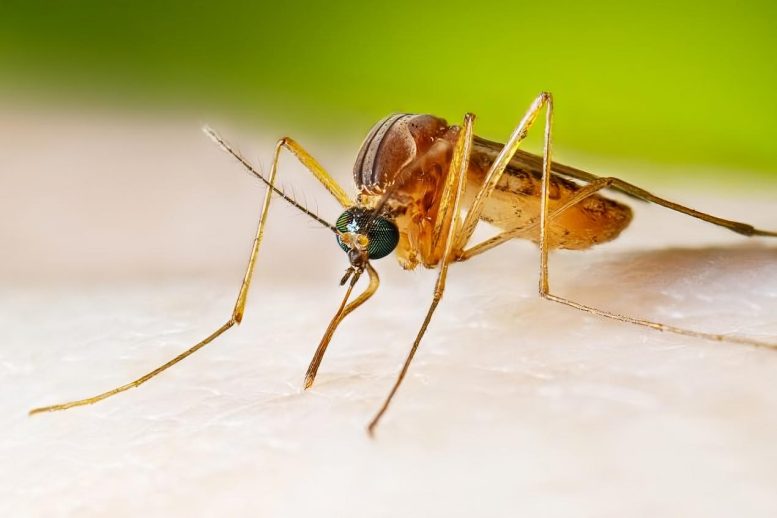
Adult female Culex mosquito taking a blood meal. Credit: CDC
Fighting back against mosquitoes by deactivating their sperm.
A recent study conducted at UC Riverside makes it likely that proteins responsible for activating mosquito sperm can be shut down, preventing them from swimming to or fertilizing eggs. This research could be a significant step in controlling the populations of Culex mosquitoes, the common household variety that spreads encephalitis and the West Nile Virus.
“During mating, mosquitoes couple tail to tail, and the males transfer sperm into the female reproductive tract. It can be stored there awhile, but it still has to get from point A to point B to complete fertilization,” said Cathy Thaler, UCR cell biologist and the study’s first author.
The key in accomplishing that journey is the specialized proteins that are released during ejaculation and stimulate the flagella, or tails, of the sperm to propel their movement.
“Without these proteins, the sperm cannot penetrate the eggs. They’ll remain immotile, and will eventually just degrade,” said Richard Cardullo, UCR biology professor and corresponding author of the new study.
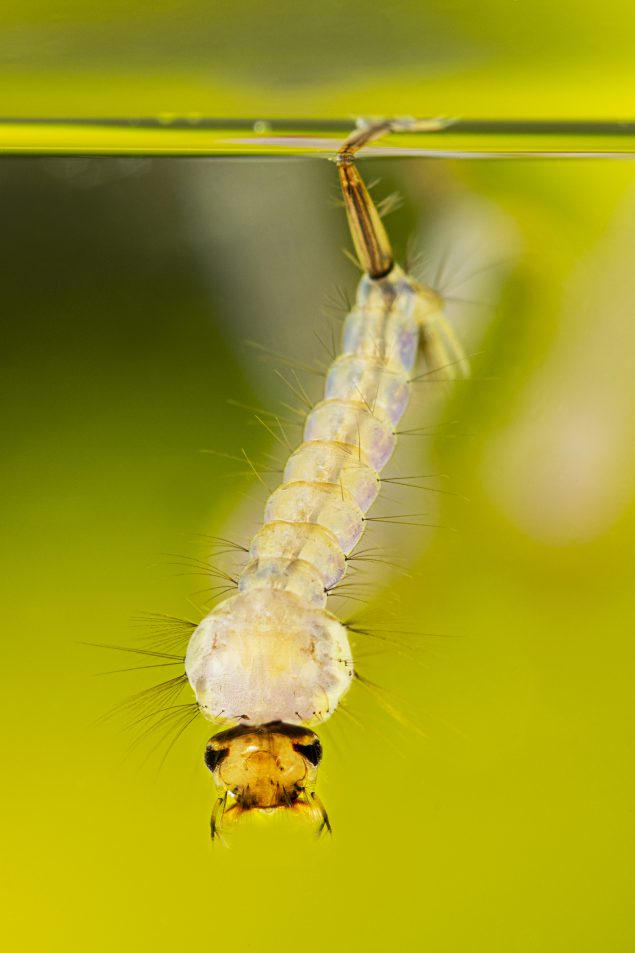
Culex mosquito larva in standing water. Credit: CDC
The study, detailed in the journal PLOS ONE, details a full portrait of all the proteins in the insect’s sperm, allowing researchers to find the specific ones that maintain the quality of the sperm while they’re inactive, and that also activate them to swim.
To get this detailed information the research team worked with a team of graduate and undergraduate students who isolated as many as 200 male mosquitoes from a larger population. They then extracted enough sperm from the tiny reproductive tracts for mass spectrometry equipment to detect and identify the proteins.
Previously, the team determined that sperm need calcium upon entering a reproductive tract to power forward motion. “Now we can look in the completed protein profile we’ve created, find the calcium channel proteins, and design experiments to target these channels,” Cardullo said.
This kind of protein profiling offers a path toward controlling mosquitoes that is more environmentally friendly than other methods that can have unintended, toxic effects. “We’ve given up on spraying pesticides all over, because that kills everything, good insects and bad, and harms other animals,” Thaler said.
“Our work sets the foundation for a form of biological control, which most would agree is preferable,” Cardullo added.
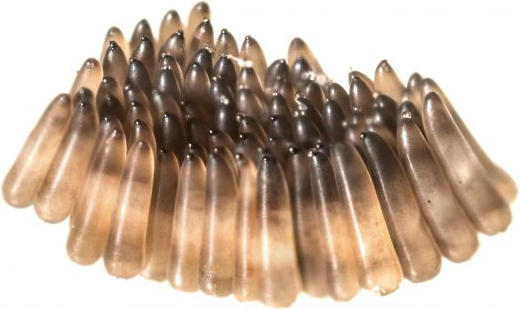
Culex species mosquito eggs. Credit: CDC
The operative word is control, rather than eradicate. Even though immobilizing the sperm would be 100% effective for the treated mosquitoes, it is not possible or desirable to kill all mosquitoes. This technology would change the proportion of fertile to infertile males in a given mosquito population, rather than wiping them all out.
“Mosquitoes are the deadliest animals on Earth. But as much as people hate them, most ecologists would oppose a plan to completely eradicate them. They play an important role in the food chain for fish and other animals,” Cardullo said.
The team is hoping that information about sperm motility regulators in Culex will also apply to other species of mosquitoes. As climate change intensifies, a lot of other mosquitoes, such as those that carry malaria, are moving into the Northern Hemisphere.
Additionally, learning more about Culex sperm motility may have implications for improving fertility in humans.
Cardullo has long studied mammalian sperm, in the hopes of developing a male contraceptive. Just as important as preventing unwanted pregnancies, however, is the effort to help couples conceive. Human fertility rates have been falling for years, in part due to environmental factors. A better understanding of sperm could help overcome some of these factors.
“Many cells have flagella, or tails, including human respiratory cells as well as cells in our guts,” Cardullo said. “What we learn in one system, such as mosquitoes, can translate to others.”
Reference: “Using the Culex pipiens sperm proteome to identify elements essential for mosquito reproduction” by Catherine D. Thaler, Kaira Carstens, Gabrielle Martinez, Kimberly Stephens and Richard A. Cardullo, 16 February 2023, PLOS ONE.
DOI: 10.1371/journal.pone.0280013

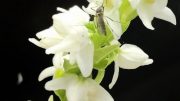
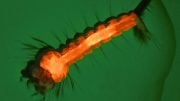
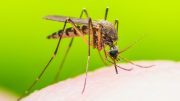
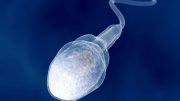
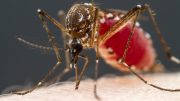
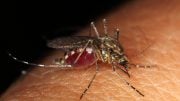
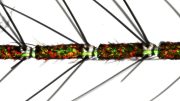
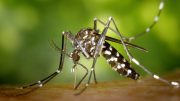
Fifty years ago (or so) an Exxon researcher developed a spray to coat standing water with a hydrocarbon film that smothered the wigglers. Wonder what happened. Too expensive for the market?
I don’t really understand why we would make such changes to species and release them in nature when the diseases they cause are relatively rare, at least in the United States. Malaria is an exception; however, Malaria is also an issue of treatment (treatment exists) and prevention in remote areas. There are so many greater disasters we could devote time to. Who knows what genetic collapse could result from releasing genetic modifications? Mark my words: if we allow genetically modified mosquitoes to be released into the gene pool, it is only a matter of time before genetically modified humans will be, too.